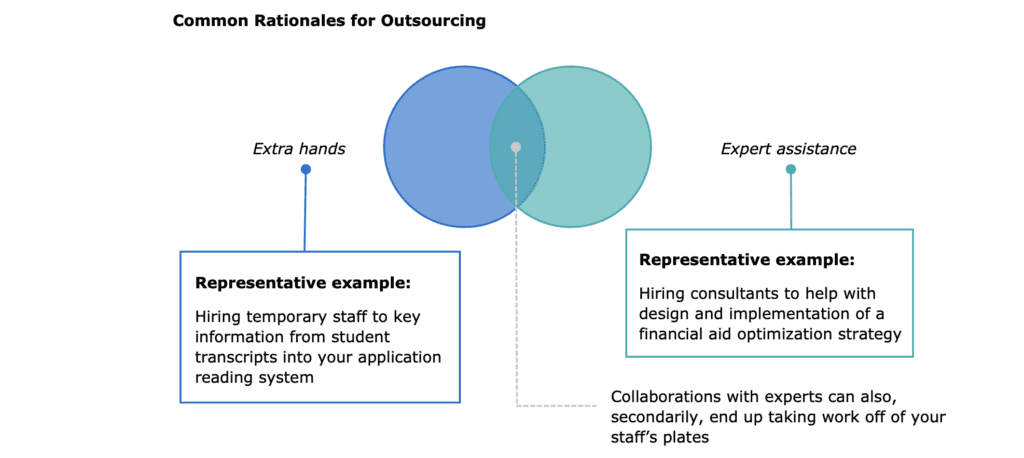More than half of surveyed graduate enrollment leaders are considering quitting—here’s why.
Our Adult Learner Recruitment team recently partnered with NAGAP, The Association for Graduate Enrollment Management, to survey more than 420 enrollment leaders across the country on their current staffing challenges.
We found that the majority of respondents find their work stressful, and 40% even find it more stressful than last year. If you work in enrollment, this finding likely won’t come as a surprise, between mounting pressures to reach new students, generate more revenue, and achieve growing headcount goals. What might be more surprising: over 50% of respondents are considering leaving their jobs in graduate enrollment, exacerbating an already dire staffing situation on many campuses.
-
89%
of survey participants find their work moderately to extremely stressful
-
54%
of survey participants are considering leaving their jobs
Here are three key reasons your graduate enrollment staff are considering leaving—and strategies to address these concerns.
Reason #1: Unfilled staff positions
“Unfilled staff positions” was a top factor that graduate enrollment leaders identified as contributing to workplace stress, and has been since our initial survey series in January 2022. But with many institutions operating in a tight budget environment, adding staff is often not feasible. In this context, it is important for enrollment leaders to consider ways to alleviate strain by adding new efficiencies into their workflow.
Strategy:
If enrollment teams are more efficient, they have more capacity to focus on tasks that require their expertise, such as engaging directly with prospective students and crafting smart recruitment campaigns. Effective use of new AI tools can help make a meaningful dent in workload for graduate enrollment teams, which in turn may reduce stress, improve staff retention, and support overall enrollment goals.
Read more: What is the “new AI”?
While over 75% of survey participants have used new AI in some capacity, only 4% of respondents said their enrollment teams have a formal plan for using new AI, presenting an opportunity for teams to use a technology that most respondents have already explored. Ensure your teams have the training to navigate the complexities of AI, including the legal, strategic, and reputational risks associated with the use of new AI.
Surveyed graduate enrollment leaders find the following uses of new AI most compelling: (1) drafting marketing content, (2) using chatbots to field questions, and (3) designing/optimizing marketing communication flows.
Explore the implications of AI on graduate and adult education
Reason #2: Heavier workload
Forty-five percent of participants identified “heavier workload” as a top factor contributing to workplace stress. With higher enrollment and revenue goals and fewer staff, it’s not surprising that more work is falling on graduate enrollment leaders’ shoulders. Our survey found that participants at larger schools were most impacted by a heavier workload compared to participants at smaller schools.
Strategy:
The majority of survey respondents agree that the most helpful solution to workplace stress would be to hire additional staff. When it is not feasible to hire additional staff, consider options to partner with an external vendor to support your marketing and enrollment efforts. There are two common, and sometimes overlapping, rationales for outsourcing: extra hands and expert assistance.

While some tasks are best done in-house, like maintaining your university brand, not all marketing functions can or should be owned internally. Consider tapping into external resources for functions where you need scale, specialized expertise, and staffing support.
See how one school outsourced marketing functions to support enrollment growth
Reason #3: Lack of support from leadership
Forty-one percent of graduate enrollment leaders are considering leaving higher ed because they want more support from their organization, a 10% increase since 2022. Respondents also indicated a growing desire for support and recognition from leadership to reduce stress (i.e., 9% in 2022 compared to 15% in 2023, the biggest increase from last year’s survey). One respondent noted they would appreciate “a wider recognition of the current higher education market dynamics and their broad impact across schools. Otherwise stated, an acceptance that we’re not the only ones struggling.”
Strategy:
The good news is that supporting your staff is not inherently expensive or resource-intensive—and has the potential to be implemented quickly. Survey respondents noted specifically that they want and need better communication, more empathy and rapport, and more recognition for their work from leaders.
Increasing support for staff could include training and engagement opportunities, a focus on diversity and inclusivity, professional development experiences, and more. University leaders can, and should, focus on improving relationships and communication with their staff related to exclusionary practices, such as excluding staff from decisions, subtle acts of bias contributing to an unwelcoming environment, and unclear evaluation criteria.
Review this infographic on fostering inclusive interactions
Focusing resources on addressing top stressors, as identified by staff themselves, will help you set your graduate team up for success.

More Blogs

What it takes to be a high-performance district

How to deepen donor connections in a more cautious giving climate
